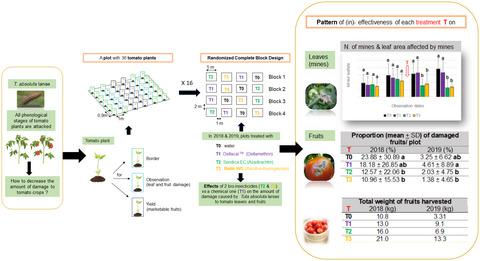当前位置:
X-MOL 学术
›
Entomol. Exp. Appl.
›
论文详情
Our official English website, www.x-mol.net, welcomes your
feedback! (Note: you will need to create a separate account there.)
Effectiveness of two biopesticides against the invasive tomato pest Tuta absoluta
Entomologia Experimentalis et Applicata ( IF 1.4 ) Pub Date : 2021-03-13 , DOI: 10.1111/eea.13047 Oumar Mal Sarr 1 , Amadou Bocar Bal 1 , Odile Fossati‐Gaschignard 2 , Nathalie Gauthier 2
Entomologia Experimentalis et Applicata ( IF 1.4 ) Pub Date : 2021-03-13 , DOI: 10.1111/eea.13047 Oumar Mal Sarr 1 , Amadou Bocar Bal 1 , Odile Fossati‐Gaschignard 2 , Nathalie Gauthier 2
Affiliation

|
Tuta absoluta (Meyrick) (Lepidoptera: Gelechiidae) is among the most devastating pests worldwide of solanaceous plants, particularly of tomato (Solanum lycopersicum L.). Since its recent introduction into sub-Saharan Africa, it has become an additional widespread tomato pest throughout the region. When no control measures are taken, yield losses caused by T. absoluta larvae can reach 100%. Chemical control remains the primary management option despite its many adverse effects and increasing inefficiency due to the species’ endophytic habits and ability to develop insecticide resistance. Safer and more effective alternatives are therefore urgently required. Here, we investigated the effectiveness of two bioinsecticides compared to that of a widely used deltamethrin-based synthetic insecticide, in preventing damage caused by T. absoluta larvae to tomato leaves and fruits, thereby affecting tomato yield. A field trial was conducted in 2018 and 2019 in northwestern Senegal using a randomized complete block design. Damage caused by T. absoluta affected approximately 65% of total leaf area and 3–24% of the fruits. Damage to the leaves caused by other insect species or other factors was less significant. At the dose applied, the chemical insecticide did not significantly reduce the surface area of leaflets affected by T. absoluta or other causal agents, the number of T. absoluta mines on the leaflets, or the proportion of fruits damaged. In contrast, the azadirachtin and Bacillus thuringiensis (Bt) formulations rapidly and significantly reduced damage to both leaves and fruits. The proportion of fruits damaged was reduced by a factor two and the total tomato yield was improved, particularly when the Bt formulation was used. In addition to their effectiveness in reducing damage caused by T. absoluta larvae to tomato leaves and fruit, and increasing the yield of marketable fruits, the viability of these organic alternatives was shown. The scope of our results is discussed in the context of T. absoluta control, in particular in integrated pest management programmes for tomato crops.
中文翻译:

两种生物农药对入侵番茄害虫 Tuta absoluta 的有效性
Tuta absoluta (Meyrick) (Lepidoptera: Gelechiidae) 是全世界茄科植物中最具破坏性的害虫之一,尤其是番茄 ( Solanum lycopersicum L.)。自从最近引入撒哈拉以南非洲地区以来,它已成为该地区另一个普遍存在的番茄害虫。当不采取控制措施时,T. absoluta造成的产量损失幼虫可达100%。尽管由于该物种的内生习性和产生杀虫剂抗性的能力,化学防治有许多不利影响并且效率越来越低,但它仍然是主要的管理选择。因此,迫切需要更安全、更有效的替代方案。在这里,我们研究了两种生物杀虫剂与广泛使用的溴氰菊酯合成杀虫剂相比,在防止T. absoluta幼虫对番茄叶片和果实造成损害,从而影响番茄产量方面的有效性。2018 年和 2019 年在塞内加尔西北部使用随机完整区组设计进行了现场试验。由T. absoluta造成的损害影响约 65% 的总叶面积和 3-24% 的果实。其他昆虫物种或其他因素对叶子造成的损害不太显着。在施用的剂量下,化学杀虫剂没有显着减少受T. absoluta或其他病原体影响的小叶表面积、小叶上的T. absoluta地雷数量或受损果实的比例。相比之下,印楝素和苏云金芽孢杆菌(Bt) 配方迅速并显着减少了对叶子和果实的损害。受损果实的比例减少了两倍,番茄总产量提高,尤其是在使用 Bt 配方时。除了它们在减少由番茄叶和果实的T. absoluta幼虫,并增加了可销售水果的产量,显示了这些有机替代品的可行性。我们的结果范围在T. absoluta控制的背景下进行了讨论,特别是在番茄作物的综合虫害管理计划中。
更新日期:2021-03-13
中文翻译:

两种生物农药对入侵番茄害虫 Tuta absoluta 的有效性
Tuta absoluta (Meyrick) (Lepidoptera: Gelechiidae) 是全世界茄科植物中最具破坏性的害虫之一,尤其是番茄 ( Solanum lycopersicum L.)。自从最近引入撒哈拉以南非洲地区以来,它已成为该地区另一个普遍存在的番茄害虫。当不采取控制措施时,T. absoluta造成的产量损失幼虫可达100%。尽管由于该物种的内生习性和产生杀虫剂抗性的能力,化学防治有许多不利影响并且效率越来越低,但它仍然是主要的管理选择。因此,迫切需要更安全、更有效的替代方案。在这里,我们研究了两种生物杀虫剂与广泛使用的溴氰菊酯合成杀虫剂相比,在防止T. absoluta幼虫对番茄叶片和果实造成损害,从而影响番茄产量方面的有效性。2018 年和 2019 年在塞内加尔西北部使用随机完整区组设计进行了现场试验。由T. absoluta造成的损害影响约 65% 的总叶面积和 3-24% 的果实。其他昆虫物种或其他因素对叶子造成的损害不太显着。在施用的剂量下,化学杀虫剂没有显着减少受T. absoluta或其他病原体影响的小叶表面积、小叶上的T. absoluta地雷数量或受损果实的比例。相比之下,印楝素和苏云金芽孢杆菌(Bt) 配方迅速并显着减少了对叶子和果实的损害。受损果实的比例减少了两倍,番茄总产量提高,尤其是在使用 Bt 配方时。除了它们在减少由番茄叶和果实的T. absoluta幼虫,并增加了可销售水果的产量,显示了这些有机替代品的可行性。我们的结果范围在T. absoluta控制的背景下进行了讨论,特别是在番茄作物的综合虫害管理计划中。











































 京公网安备 11010802027423号
京公网安备 11010802027423号